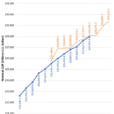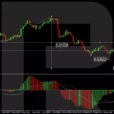In Internet slang, they are called the HODLers, the people who are clinging to their Bitcoin and refusing to spend it. Instead, they just refresh their wallet apps, feeling richer by day while deferring consumption. Many of these burgeoning millionaires live like paupers. I’ve met many of them: all over the U.S., in Israel, in Brazil. They believe that every dollar they spend today is two dollars they won’t make in a few months. Probably they are right.
There is nothing selfish, strange, or weird about holding an asset that is rising in value.
Bitcoin is undergoing a historic deflation, which simply means that its value is growing relative to the goods and services it can purchase. This is in contrast to inflation, in which the value of the currency falls relative to its purchasing power. Inflation inspires spending – better to get rid of the money while it is more valuable. Deflation inspires saving – better to keep it so that your wealth rises over time.
So there is nothing selfish, strange, or weird about holding an asset that is rising in value. It would be irrational to do otherwise. And there is nothing odd about spending like mad in an inflation either. Our expectations of the future determine what we do today in every life and especially in monetary economics.

Some Money!
This tendency to hold rather than spend is giving rise to a new claim. Bitcoin isn’t really a viable medium exchange, they say. You can’t buy a sandwich with it. Few people are paid in it. Adoption in the retail sector is slow. The total market capitalization is $219 billion and yet the trade volume nowhere near reflects that.
And it is true that most of the big money people are just holding it. James Mackintosh, writing in the Wall Street Journal, summarizes the conclusion: “It has become a vehicle for hoarding by libertarians for gambling by hordes of speculators attracted to its wild price swings.”











Leave A Comment